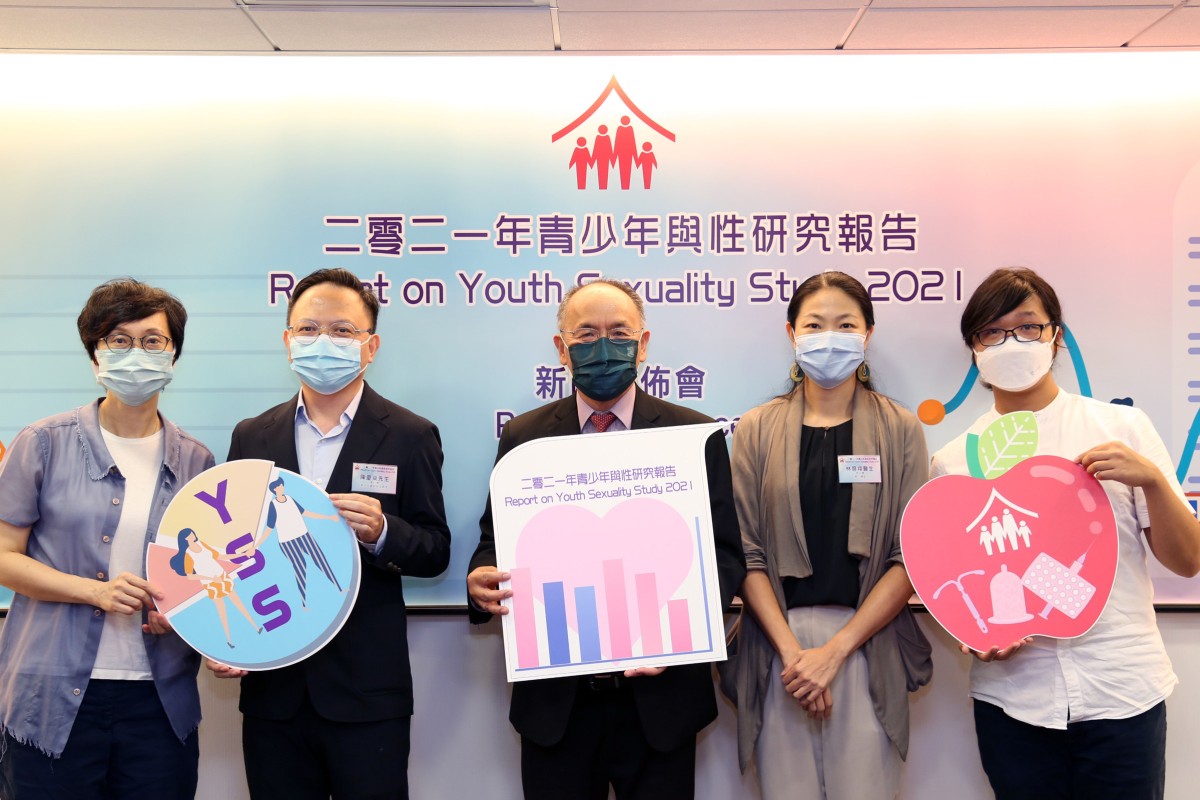
- Youth Sexuality Study shows teens are more accepting of LGBT+ people but lack knowledge about contraception and sexually-transmitted diseases
- Girls said they want to learn more about dealing with sexual harassment, while boys indicated a desire to learn about safe sex; both want more information about dating
 From left: Dr Dau Wong Kit-mui; Sun Chan; Prof Paul Yip; Dr Mona Lam, and Kung Man-chun, the working group on the Youth Sexuality Study 2021. Photo: Handout
From left: Dr Dau Wong Kit-mui; Sun Chan; Prof Paul Yip; Dr Mona Lam, and Kung Man-chun, the working group on the Youth Sexuality Study 2021. Photo: HandoutHong Kong’s secondary school students demonstrate a greater acceptance of gender identity and sexual orientation but their knowledge of topics related to sex and sexual health is still unsatisfactory, a new report on youth sexuality has revealed.
Conducted by The Family Planning Association of Hong Kong (FPAHK), the Youth Sexuality Study has been released every five years since 1981 to help the city understand the trends of local youth’s knowledge, attitudes, and behaviours towards sexuality.
Its ninth report, published on Tuesday, was carried out from last May to July and surveyed 8,343 secondary school students from Form One to Six, with 3,713 girls and 4,630 boys. It covers five key findings from the survey, from sex education to dating experience.
Hong Kong students don’t receive adequate sex education, survey reports
New questions on gender identity were first introduced in the survey to recognise sexual minorities. Professor Paul Yip Siu-fai, honorary adviser and chairman of the research subcommittee of FPAHK, believed that the questions have provided a glimpse into the complexity of gender identity.
About 14 per cent of students said they were unsure about their gender identity, while a small percentage indicated that their gender identity was different than the one they were assigned at birth. This was more common among girls (4 per cent) than boys (2 per cent).
“I think a majority of young people still identify with [the gender] they were given at birth … They [the group of sexual minority students] are not small and … we have to deal with it with professionalism,” said the scholar, noting that students today possess a high acceptance of the LGBT+ community.
Sex education in Hong Kong: Things you need to know, but were too afraid to ask
Nearly 80 per cent of Form Three to Six girls showed acceptance of female and male homosexuality and bisexuality, a dramatic increase from 40 per cent a decade ago. There is also an upwards trend of acceptance for senior male students compared to 2011, from about 30 per cent to more than half.
Students have also become more accepting of their transgender peers, with the rate for senior form female students increasing from 27 to 68 per cent, and male respondents rising from 16 to 42 per cent.
“Teenagers nowadays have a wider understanding of their gender identity and sex-related behaviours. We [educators] should catch up to their pace and be prepared to accompany them to walk through the journey of self-exploration,” said Yip.
Day Wong Kit-mui, associate professor of sociology at Baptist University, agreed with Yip and stressed that more attention should be given to students who are unsure about their gender identity.
“Those students are still in a state of exploration and confusion … [before], most of them could only rely on organisations like Quarks – which supports trans teens – news articles, and online information,” said Wong, adding that schools should provide a safe space for students to discuss their gender identity.
Yet even though students have a greater acceptance of gender identity and sexuality, their sexual health knowledge is still unsatisfactory, the report indicated.
How do I come out as genderfluid to my transphobic parents?
Compared to 2011, students’ performance on questions related to contraception and sexually-transmitted diseases, among other issues related to sexual health, had declined.
Consisting of 12 questions, the average score for Form One and Two students was “undesirably low” at 5.15, a slight drop from 5.7 a decade ago. For Form Three to Six students, the average score was 8.05, dropping from 9.05 in 2011.
“[The results show that] there is a room for improvement … and also a huge leap forward in knowledge when students move to senior form,” Yip noted, adding that girls generally score higher than boys.
When it comes to sex education, both male and female students said they wanted to learn more about dating and love and adolescent development. Female students also indicated a desire to learn more about preventing and dealing with sexual harassment, while boys wanted to learn more about safe sex.
The report also revealed that students have been more exposed to cybersexual violence since they have been spending more time online during the pandemic. About 60 per cent of girls and 65 per cent of boys had been exposed to pornographic content on social media, while around 5 per cent of girls and 9 per cent of boys had experienced image-based sexual violence.
I’m pretty sure I’m straight - or am I?
Dr Mona Lam Wai-cheung, the executive director of FPAHK and a specialist in obstetrics and gynaecology, said the findings underscored the need for comprehensive sex education, as well as media literacy education to help teenagers protect themselves.
“We should cater to their needs and interests and make good use of the internet and social media to teach them about sex,” said Lam.
She added: “Sex education should be taught at a young age and it should be expanded to cover more topics. We should also go deeper to instil a positive attitude and the right values towards sex in students.”
